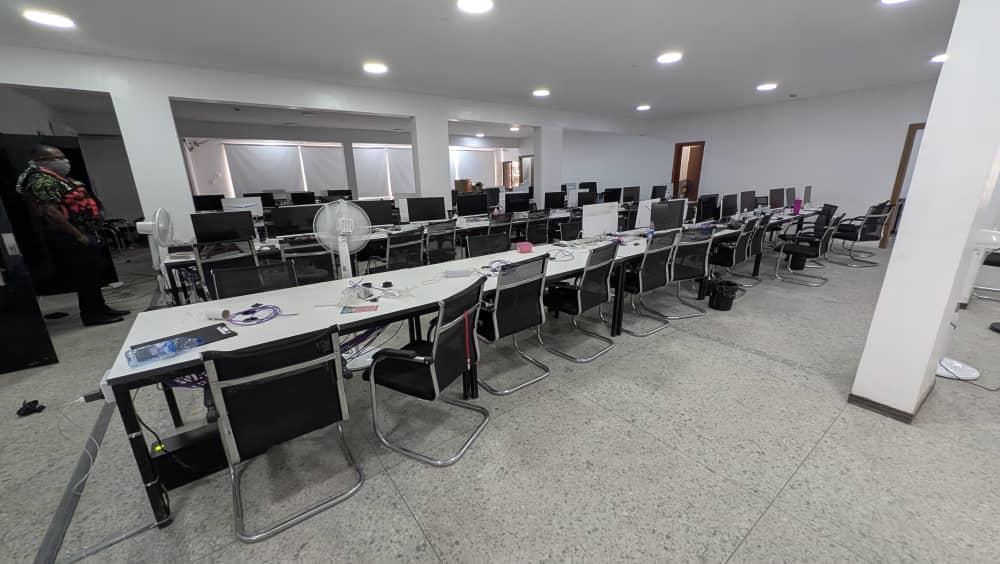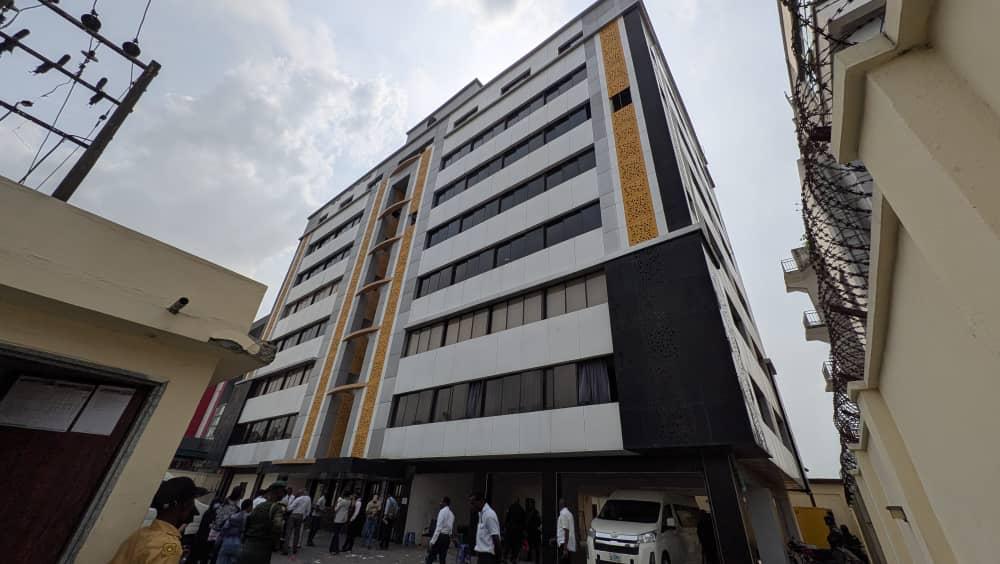Lagos, Nigeria – The Executive Chairman of the Economic and Financial Crimes Commission (EFCC), Ola Olukoyede, has disclosed that the Commission, in a landmark raid, arrested 792 suspects for their alleged involvement in cryptocurrency investment fraud and romance scam.
The suspects were apprehended on Tuesday, December 10, 2024, in a surprise operation at their hideout, an imposing seven-storey edifice known as Big Leaf Building, on No.7, Oyin Jolayemi Street, Victoria Island, Lagos, following verifiable intelligence received by the Commission.
Speaking during a media briefing on Monday, December 16, 2024, at the Lagos Zonal Directorate of the Commission, Olukoyede stated that 148 Chinese, 40 Filipinos, two Kharzartans, one Pakistani, one Indonesian were arrested during the operation.
The EFCC’s boss, who spoke through the Director, Public Affairs, EFCC, Commander of the EFCC, CE Wilson Uwujaren, further stated that the foreign nationals used the facility, which could be mistaken for a corporate headquarters of a financial establishment, to train their Nigerian accomplices on how to initiate romance and investment scams and also used the identities of their Nigerian accomplices to perpetrate their criminal activities.
According to him, “All the floors are equipped with high-end desktop computers. On the 5th floor alone, investigators recovered 500 SIM cards of local telcos that were bought for criminal purposes.
“Their Nigerian accomplices were recruited by the foreign kingpins to prospect for victims online through phishing, targeting mostly Americans, Canadians, Mexicans, and several others from European countries.
“They usually arm them with desktop computers and mobile devices and create fake profiles for them.
“The Nigerian accomplices are equally provided with logs that allow them access to foreign communication lines and victims, which they chat with on WhatsApp, Instagram and Telegram.”

While giving further details about the modus operandi of the syndicate, the EFCC Chair said the Nigerian accomplices, who are assigned WhatsApp accounts linked to foreign telephone numbers, especially from Germany and Italy, engage victims in romantic conversations as well as phantom business and investment discussions to trick them to shop on the purported online investment shopping platform called yooto.com.
He added: “For those who show interest, activation fees for an account on the platform start from $35 USD.
“Investigation revealed that the criterion for recruiting these young Nigerians is proficiency in the use of computers, especially typing skills. Those who passed the test are given desktop computers and mobile devices and then taken through a two-week induction on how to personate foreign females in romance scam chats and convince victims to invest in their employers’ cryptocurrency investment scams.
“Once the Nigerians are able to win the confidence of would-be victims, the foreigners would take over the actual task of defrauding the victims and proceed to block their Nigerian accomplices from the network. This would then leave them in the dark about the transaction.”
He, however, said the Nigerians involved in the alleged fraudulent activities “do not know the owners of the ‘company‘ they work for because they are not offered letters of appointments or receive payment from a corporate account.”

According to him, the suspected Nigerian accomplices are usually paid either in cash or through an individual’s account.
Olukoyede said the Commission was working with its foregoing partners to establish the extent of the scam and the accomplices as well as the likelihood of any collaboration with organised international fraud cells.
The EFCC Chair also used the occasion to debunk the notion that Nigerians are behind the tonnes of fraud emanating from the country.
“Foreigners are taking advantage of our nation’s unfortunate reputation as a haven of frauds to establish a foothold here to disguise their atrocious criminal enterprises. But, as this operation has shown, there will be no hiding places for criminals in Nigeria,” he said.
Also speaking during the occasion, the acting Zonal Director of Lagos Zonal Directorate of the Commission, Michael Wetkas, sought greater collaboration with the media in the fight against corruption and economic and financial crimes.
Items recovered from the suspects include desktop computers, mobile phones, laptop computers and cars at the point of arrest.
The suspects will be charged in court after investigations are concluded.
The primary legal framework for addressing cybercrime in Nigeria is the Cybercrimes (Prohibition, Prevention, etc.) Act, 2015. This Act, which came into force on May 15, 2015, aims to provide an effective, unified, and comprehensive legal, regulatory, and institutional framework for the prohibition, prevention, detection, prosecution, and punishment of cybercrimes in Nigeria. Here are some key points regarding the cybercrime laws in Nigeria:
Offenses Covered: The Act criminalises various cyber offenses including but not limited to unauthorised access to computer systems, cyberstalking, cybersquatting, cyberterrorism, child pornography, identity theft, and hacking. Specific sections of the Act deal with:
- Unauthorised access to computer systems or networks (Section 6).
- Interference with computer systems or networks (Section 8).
- Cyberstalking (Section 24, which was notably controversial and has been amended in 2024 to clarify definitions and reduce potential misuse for suppressing free speech).
- Cybersquatting (Section 25).
- Cyberterrorism (Section 18).
Penalties: The penalties for these offenses vary, ranging from fines to imprisonment, with some offenses like cyberterrorism potentially leading to life imprisonment or the death penalty if the crime results in someone’s death.
Amendments: There have been significant amendments, notably:
- The Cybercrimes (Prohibition, Prevention, etc.) (Amendment) Act, 2024 addressed some of the criticisms of the original Act, particularly around Section 24, which was often used to prosecute individuals for ‘insulting’ or ‘annoying’ messages on social media. The amendment removed vague terms to prevent misuse for silencing critics or journalists.
Jurisdictional and Enforcement Challenges: The enforcement of these laws faces challenges due to the global nature of the internet, requiring international cooperation. Nigeria has made strides in this area, with institutions like the Economic and Financial Crimes Commission (EFCC) actively involved in cybercrime investigations and prosecutions.
Public and Legal Scrutiny: The Cybercrimes Act has been subject to scrutiny, especially regarding freedom of expression. The ECOWAS Court has ruled that parts of the Act, specifically Section 24, were vague, arbitrary, and unlawful, leading to calls for its amendment, which has since been addressed.
Cybersecurity Funding: A notable aspect of the law is the levy of 0.5% on electronic transactions, remitted into the National Cyber Security Fund, aimed at enhancing cybersecurity measures in the country.
Institutional Framework: The Act establishes the Cybercrime Advisory Council to coordinate the implementation of the Act’s provisions and promotes cybersecurity across sectors. The National Security Adviser coordinates various agencies in this regard.
This overview captures the essence of Nigeria’s cybercrime legal framework, showing a balance between the need for security and the challenges in protecting freedom of expression in the digital space.




